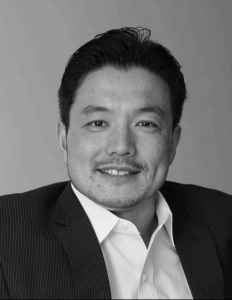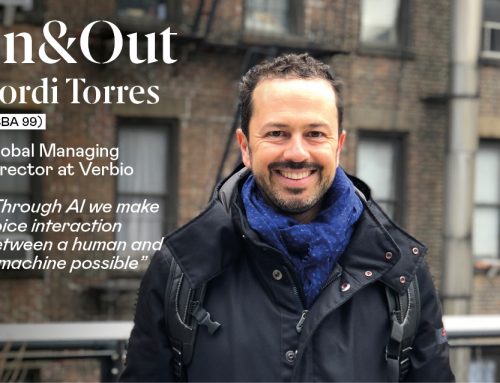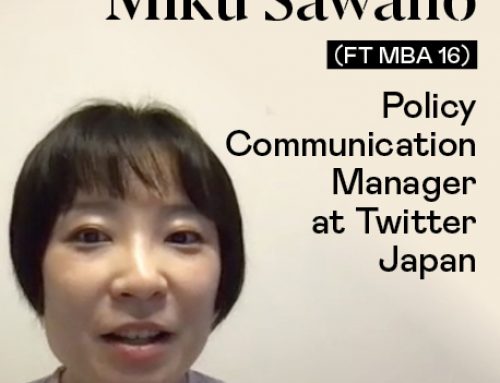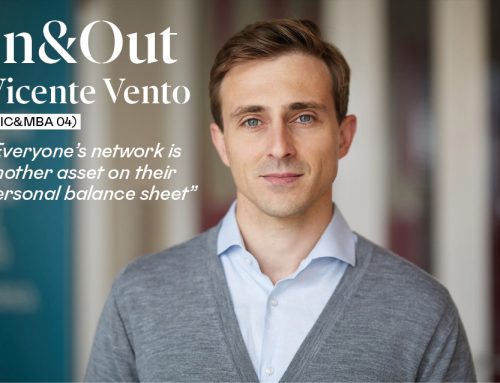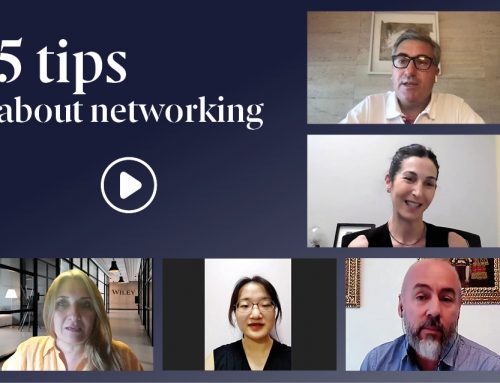Satoshi Saito (MBA 05), Director of Sponsorship Planning + Activation at GMR Marketing
As Director of Sponsorship Planning + Activation in GMR Marketing’s Japan office, Satoshi Saito is responsible for developing marketing strategies and supporting Olympic and sponsorship clients in the Japanese market.
-In your current position as GMR Marketing, what challenges do you face?
There are many challenges. First, no one knows “GMR” in Japan. GMR Marketing is a global sports marketing agency with more than 1300 employees in 16 different countries. We are the best Olympic activation agency in the world, however, since we just established an office for the first time in Japan, I have to start from scratch, introducing who we are. Second, very few people in Japan know what “sports marketing,” “sponsorship activations” and “sports hospitality” are. When I introduce GMR and myself, I have to explain to people what those mean and how effective they are to the sponsors. Third, I am the only GMR team member in Japan. The Japan office was established on August 1, 2017. What is interesting is at the last summer Olympics in Rio, GMR had about 400 people in Brazil, so let’s see how the Japan office will grow!
-Which are the particularities of the sports marketing?
Sports marketing is about emotion. We the sports marketers utilize people’s love for sports to connect sponsors with consumers who have a similar vision and mission. Sports have a lot of good positive vibes in our society. Globally, not many people hate sports, or at least people wouldn’t think sports are harmful to the human society. It is a fundamental marketing tool and a common global language that everyone speaks.
-What role do marketing and communication play in the success or failure of a project?
Marketing and communications play a critical role in the success of any project. I was a FIFA Marketing Consultant for the last four years, developing Cambodia football. When I started in 2013, at the Cambodian National Team match, there were only 4.000-5.000 people at the stadium. Now, in 2017, against any opponent, even for instance East Timor or Afghanistan, the Cambodian National Team match is fully sold out, with more than 55,000 people! How did we do it? You have to visit Cambodia and the stadium to know it!
-What achievement are you most proud of in your professional career?
FC Barcelona. In 2003, when I joined the club, the new management had the vision to win La Liga and Champions League. However, I personally had a dream that all of our marketing and promotional efforts would impact fans around the globe. That one day, somewhere in Asia, kids playing football in the streets would be wearing FC Barcelona shirts and dreaming of becoming a FC Barcelona player.
10 years later, when I visited the Cambodian countryside as a FIFA Marketing Consultant on a mission to support Cambodia football, I encountered exactly the view I imagined 10 years ago in Barcelona!! Although the FCB shirts the kids were wearing were 100% counterfeit, I felt that making someone love FC Barcelona 10.000 km away from Barcelona was a great lifetime achievement. My contribution to the successful establishment of a global fan base for FC Barcelona is very small compared to the club winning championships or having amazing players such as Messi, Neymar, and Suarez, however, I still think it is the marketer’s job to make fans fall in love with what you are selling and become loyal consumers.
– How have your previous experiences in FIFA and FC Barcelona helped you for the following challenges?
I was very fortunate to work for two of the best global brands in sports. Knowing that both organizations are well-known globally, but are still like any other sports organization with similar business challenges and opportunities, gives me confidence to face any struggles required in sports. And it’s great to have them on my CV – always gets the hook for the first interview!
– What job opportunities do the city of Tokyo offer? What aspects should consider the alumni who comes to work in Japan?
Thanks to the major global sports events coming to Japan—the 2019 Rugby World Cup and the 2020 Tokyo Olympics and Paralympics—a lot of jobs, especially those related to sports management, are created. Not only for the Japanese, but non-native Japanese speakers are also needed to make the global events successful. Any ESADE alumni who are interested in living in a different cultural environment and have experience working in sports management would be welcome. However, you must have a never give up attitude if you want to work in Japan!
-You have also experience in entrepreneurship. What did you learn?
Entrepreneurship is a great platform to experience failures. Before coming to ESADE, I established a company, but it did not take off. If I worked for a larger organization, I would have never understood why things didn’t go according to plan; however, when I started my own business, and I was responsible for everything—I knew exactly why things failed. By that same logic, when you’re an entrepreneur you receive credit for every success you have. As I establish GMR Japan, I am very excited to see how the ESADE knowledge and all the other experiences help me to succeed—check back with me in 2020 to see how everything went!
-What would you highlight about ESADE?
The real reason I chose ESADE is to help me work for FC Barcelona. Everyone in my class helped me to get a job at FC Barcelona. All 130 students and 20 faculty members acted as my agents—I cannot thank them enough. From day one, I was saying to everyone that “the reason I’m here is to work for FC Barcelona; anyone has any connections to FC Barcelona staff?” Many of my classmates believed in my FC Barcelona dream and made an introduction to someone on the staff. I paid them back for all of their help with FC Barcelona match tickets after I got the job there!
– With a good command of three languages and an extensive network of contacts internationally, what do you think are the benefits of having the ESADE Alumni International Network?
ESADE Alumni International Network is amazing. Alumni are everywhere in the global business world, and I really enjoy meeting them. The extensive network of contacts internationally and my good command of three languages allows me to ask the questions directly to people that I trust, and get a reply in few minutes via the internet—email, SNS, chats, etc. With what is happening in the world, I trust my friends around the globe more than any other news source.
-What advice would you give to alumni who want to develop their professional career in sports management?
Developing a professional career in sports management is tough but fun. Millions of people dream of being in sports management, but there are relatively few positions available—this provides extra motivation to prove my value to the company because there is always someone to replace you. Nevertheless, working in sports is a dream. My kids watch me leave my house every morning with a smile on my face, and they think their dad is just going to do his hobby and not his job. I am so fortunate that I get to live my dream every day.

